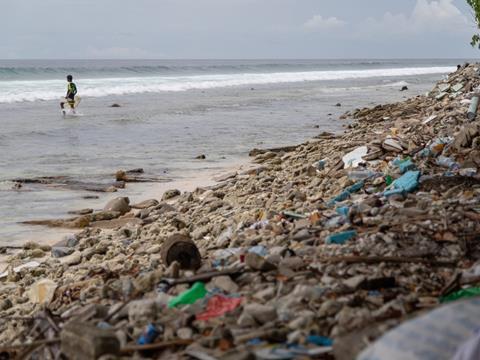
A new report from SYSTEMIQ suggests fifteen global policy interventions that it believes could drive down the mismanagement of end-of-life plastics and the leakage of microplastics into the environment by 2040.
Commissioned by the Nordic Council of Ministers for the Environment and Climate, the study – Towards Ending Plastic Pollution by 2040 – proposes an alternative 2040 scenario in which the interventions are supported by globally harmonized rules in an international and legally binding instrument on plastic pollution.
Without united global action, SYSTEMIQ warns, the same time frame could result in a 66% rise in virgin plastic from 430 million tonnes (Mt) in 2019 to 712 Mt in 2040; a doubled volume of mismanaged plastic up to 205 million Mt; and a 63% increase in greenhouse gas emissions.
Therefore, between 2019 and 2040, its ‘Global Rules Scenario’ looks towards a 30% reduction in global virgin plastic production via reuse, recycling, and the limitation of single-use plastics. By reducing and eliminating plastics where necessary and implementing circular system, it also foresees a 90% reduction in the volume of plastics mismanaged annually.
Global recycling output could increase by sevenfold, the report continues, if recycling targets, product design rules, EPR schemes, and fees on virgin plastics were put in place to support the progress. Where waste cannot be prevented or recycled, it recommends controlled disposal, which could nevertheless decrease by 46% in some developed countries.
Other developing nations would apparently undergo a 74% increase in controlled disposal compared to 2019, which is attributed to the implementation of improved solutions being overrun by rapid population and economic growth. Greenhouse gas emissions from the global plastics industry would also remain the same as levels in 2019, yet would mitigate 40% of emissions compared to a business-as-usual scenario, the report argues.
To limit global warming to 1.5°C, SYSTEMIQ pushes for the decarbonisation of energy supplies or the electrification of plastic production processes.
In regions with existing infrastructure, cumulative public expenditure between 2025 and 2040 would apparently be saved by the implementation of these policies, since the amount of plastic waste to be collected and managed would theoretically decrease. Municipalities that do not currently have the necessary equipment would still need to increase their spending, according to the report.
Overall, the report asserts that the interventions serve as a starting point and could, in future, lead to significant progress in the fight against plastic pollution. Even so, the successful enforcement of these interventions is still expected to leave 13 Mt of plastics mismanaged, 5 Mt of which would be microplastics. Impacts on human health and the environment would therefore remain, and SYSTEMIQ concludes that further research, data, and innovation must be undertaken for a more comprehensive result.
“An ambitious plastic treaty is a unique opportunity to end plastic pollution by 2040,” said Gudlaugur Thór Thórdarson, Icelandic Minister of the Environment, Energy and Climate. ”This report shows how current global policies, even if upgraded, do not solve plastic pollution entirely.
”Therefore, we will have to face tough negotiations, spur on more innovation, gather new knowledge and mobilise more ambitious policies to get there. Our future demands a truly circular plastic economy and clean oceans.”
Yoni Shiran, partner and plastics lead at SYSTEMIQ, added: “This report sets a new benchmark and shows that implementing 15 far-reaching policy interventions globally could take us a long way in the journey towards ending plastic pollution by 2040. The suggested policy package presents a starting point. However, further and stronger measures are required to eliminate mismanaged plastics fully, address risks to health and biodiversity, ensure a just transition and tackle the climate crisis.”
Back in January, a partnership was announced between the World Economic Forum’s Global Plastic Action Partnership (GPAP), the Ellen MacArthur Foundation’s Plastics Initiative, and WRAP. This sought to facilitate the sharing of knowledge between their global initiatives and encourage global progress in combating plastic pollution.
Further plastic reduction efforts have since arisen, including a strategic partnership between Amcor, Mars, P&G, and Delterra to scale up upstream and downstream circular plastics in the Global South and lower plastic pollution in the region.
Previously, a synthesis study by SYSTEMIQ stated that ‘very high’ recycling rates and lower carbon emissions could be achieved for PET and polyester packaging solutions through the joint scaling up of chemical and mechanical recycling technologies.
If you liked this article, you might also enjoy:
The L’Oréal approach to packaging sustainability
What steps is Apple taking to make its packaging more sustainable?
How did Brazil achieve its 100% aluminium can recycling rate – and can it be replicated in the EU?
Experts have their say on the EU’s Packaging and Packaging Waste Directive revisions













No comments yet